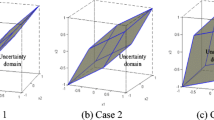Abstract
Traditional reliability metrics are based on probability measures. However, in engineering practices, failure data are often so scarce that traditional metrics cannot be obtained. Furthermore, in many applications, premises of applying these metrics are violated frequently. Thus, this paper will give some new reliability metrics which can evaluate products’ reliability with few failure data. Firstly, the new metrics are defined based on uncertainty theory and then, numerical evaluation methods for them are presented. Furthermore, a numerical algorithm based on the fault tree is developed in order to evaluate systems’ reliability in the context of defined metrics. Finally, the proposed metrics and evaluation methods are illustrated with some case studies.
Similar content being viewed by others
References
Cai K., Wen C., Zhang M. (1991) Fuzzy variables as a basis for a theory of fuzzy reliability in the possibility context. Fuzzy Sets And Systems 42(2): 145–172
Chen X., Liu B. (2010) Existence and uniqueness theorem for uncertain differential equations. Fuzzy Optimization and Decision Making 9(1): 69–81
Ebeling C. (2010) An introduction to reliability and maintainability engineering. Waveland Press, Long Grove
Fussell J., Vesely W. (1972) New methodology for obtaining cut sets for fault trees. Transactions of American Nuclear Society 15(1): 262–269
Liu B. (2007) Uncertainty theory (2nd ed.). Springer, Berlin
Liu B. (2009) Some research problems in uncertainty theory. Journal of Uncertain Systems 3(1): 3–10
Liu B. (2010) Uncertain risk analysis and uncertain reliability analysis. Journal of Uncertain Systems 4(3): 163–170
Liu B. (2011) Uncertainty theory: a branch of mathematics for modeling human uncertainty. Springer, Berlin
Liu B. (2012) Why is there a need for uncertainty theory?. Journal of Uncertain Systems 6(1): 3–10
Meeker W., Escobar L. (1998) Statistical methods for reliability data. Wiley, New York
Meeker W., Hamada M. (1995) Statistical tools for the rapid development and evaluation of high-reliability products. IEEE Transactions on Reliability 44(2): 187–198
Nelson W. (1990) Accelerated testing: statistical models, test plans and data analyses. Wiley, New York
Peng Z., Iwamura K. (2010) A sufficient and necessary condition of uncertainty distribution. Journal of Interdisciplinary Mathematics 3(1): 277–285
Tan M., Tang X. (2006) The further study of safety stock under uncertain environment. Fuzzy Optimization and Decision Making 5(2): 193–202
Tversky A., Kahneman D. (1986) Rational choice and the framing of decisions. Journal of Business 59: 251–278
Wang, Z. (2010). Structural reliability analysis using uncertainty theory. In Proceedings of the first international conference on uncertainty theory (pp. 166–170), Urumchi.
Author information
Authors and Affiliations
Corresponding author
Rights and permissions
About this article
Cite this article
Zeng, Z., Wen, M. & Kang, R. Belief reliability: a new metrics for products’ reliability. Fuzzy Optim Decis Making 12, 15–27 (2013). https://doi.org/10.1007/s10700-012-9138-5
Published:
Issue Date:
DOI: https://doi.org/10.1007/s10700-012-9138-5




